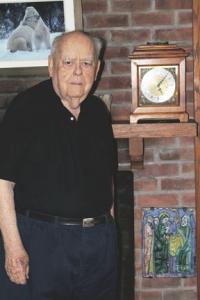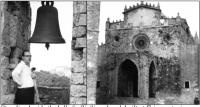Main Sections
Front Page
SportsValley VitalsIt's in the StarsStarwiseArchivesLinksAbout The VoiceContact Us
|
Sharing Memories And World Travels With Walter Richard Calhoun

photo provided Standing in his Middlebury home, Walter Richard Calhoun shares memories that take place not only in Middlebury, but around the world. |
| 
photo provided Standing beside the bell of a Sicilian church built at Erice centuries ago, Walter Calhoun shares stories of an incredible career spanning two continents and several languages. |
|
Tuesday June 17, 2014
By Cookie Steponaitis
“Middlebury, Vermont was a lot smaller than it is now, for sure,” shared Walter Richard Calhoun as he reminisced about the town of his birth and his home today. Walter Richard Calhoun has seen a considerable portion of the world in between those two parts of his life and witnessed America’s transformation from a rising nation to becoming a world power. Walter studied several languages in his life working around Europe and the Middle East and in parts of the world where his classics training and education came alive. “It was a great life experience,” shared Walter, “and I made lifelong friends.” He was born on January 25, 1927 and easily shares memories of the milkman in Middlebury drawing his horse and buggy up to the house he shared on South Street with his parents and brother and being able to stick his finger in the cream at the top of the bottle. Deliveries also included blocks of ice for the ice-box which kept the family food cool for several days until the ice man came again.
Walter attended Middlebury Elementary School known today in the community as Twilight Hall on the campus of Middlebury College and thrived in a school setting. He spoke not only of the influence of his mother Evelyn Calhoun who began teaching in 1913 and had a long career teaching in the Commercial Department of Middlebury High School known today to residents as the town offices, but of his second and third grade teachers G. Lena Woods and Florence Flag. These teachers taught the thirty-eight students in Walter’s class all day and were in his memory stellar teachers. He chuckled when he shared a memory of walking down the street in Middlebury with his Aunt Agnes on the way to his grandmother’s house and naming all the dogs that lived on the street. He was eight years old and felt proud of accomplishing such a feat and his Aunt shook her head and asked him, “How is it possible you can name every dog on the street and not know the names of the people?”
After spending his first two years of high school in Middlebury, Walter left Vermont to attend a seminary college in Baltimore, Maryland and then seminary in Ottawa, Canada. He returned to Vermont and did graduate studies in Classical Studies from the University of Vermont. Walter felt he should honor his military obligations to his nation and enlisted in the U.S .Army serving from 1950-1952 during the Korean War stationed at Fort Dix, New Jersey and Fort Slocum New York. Walter worked for the State Department after his years of service and would begin his career when was assigned to go to France. The week he was to depart a bureaucratic decision was made to send him to Palermo, Sicily instead and of the languages in Calhoun’s arsenal, Italian was not one of them. “I arrived in Italy speaking no Italian,” shared Walter, “and the family I lived with spoke no English. For the first six weeks at least it was total immersion and a total crash course in culture.”
Walter was sent to interview and perform background checks on people who had filed under the Refugee Relief Act and were seeking admission to the United States. He found himself learning about people from all walks of life and cultures whose common denominator was being displaced during World War II. Walter was also sent to Stuttgart, Germany and Tehran, Iran. “Now that was a fascinating assignment,” remarked Walter. “You have to remember it was 1956. The culture was not that advanced and the climate intensely hot and dry. Most of the people I interviewed there for the Refugee Relief Act were Russian. In Persia I worked with a translator.” When asked to share the rationale of the different people seeking to come to America Walter shared that, “the people saw America as a place where the streets were lined with gold and where opportunity was theirs for the taking.”
A Classics major and man with a knowledge of languages Sicily was much more to Walter Calhoun than an assignment. Photographs fill his albums and images fill his mind and memories with places that date to 1000 BCE and draw him in to experience life in nations where culture is dated in centuries and not in decades. While Walter returned to Vermont in the early 1960’s he has been back to Sicily many times and still corresponds with friends in Rome, Sicily and in Europe. Walter takes classes today in Italian to keep his skills sharp and stresses to young people today to get their heads out of their cell phones and get themselves study abroad opportunities. “You don’t need to know the language as much today because most people speak English,” remarked Walter, “but immersion in the culture is still the best way to learn it.”
Even his flight home from Europe gave Walter a sharp jolt as to how America was changing and the world with it during his life time. “When I flew over from New York to Paris in 1952,” shared Walter, “the trip took me thirteen hours. Upon my return flight from Paris to New York in 1958 the same route was flown in six and a half hours. Jet engines had been introduced while I worked overseas.”
Walter has worked for the State of Vermont for over thirty years and witnessed many transitions and changes in Vermont as well as in his beloved Middlebury. “When I started the state had 2500 employees,” expressed Walter. “Today that number is around 8000.” He has been a member of the Addison County Court Diversion Board and the Town Agent for the past twenty-five years and is deeply rooted in community service and involvement. When asked to share some advice to the next generation waiting in the wings Walter was quick to remark, “Think of your friends and your neighbors first and not yourself. The rest will fall into place.”
A connoisseur of wines and Sicilian history, “ Dick “ has judged at the International Wine Exposition in Montreal with fellow judges Brit Michael Broadbendt, Argentinean Estabon Takacs, and Italian Etzio Rivella. While Dick prefers himself champagnes and admits if given the choice he would drink only Salon, the only champagne, the Duke of Windsor always, drank, he is very excited and proud of the Vermont agricultural community for their bounty of first class gourmet cheeses, beers and growing wine industry.
While the world today is obsessed with immediate and instant communication Walter ended the interview with a smile and the suggestion that perhaps instead of basing life on how many Facebook friends they have the best parts of life are still found in conversation, communication and by traveling and living it. Incredibly sound advice from a man whose career spanned two continents and an era that transformed America and Addison County.
|
Advertisements
Search our Archives
|




 Printer Friendly
Printer Friendly